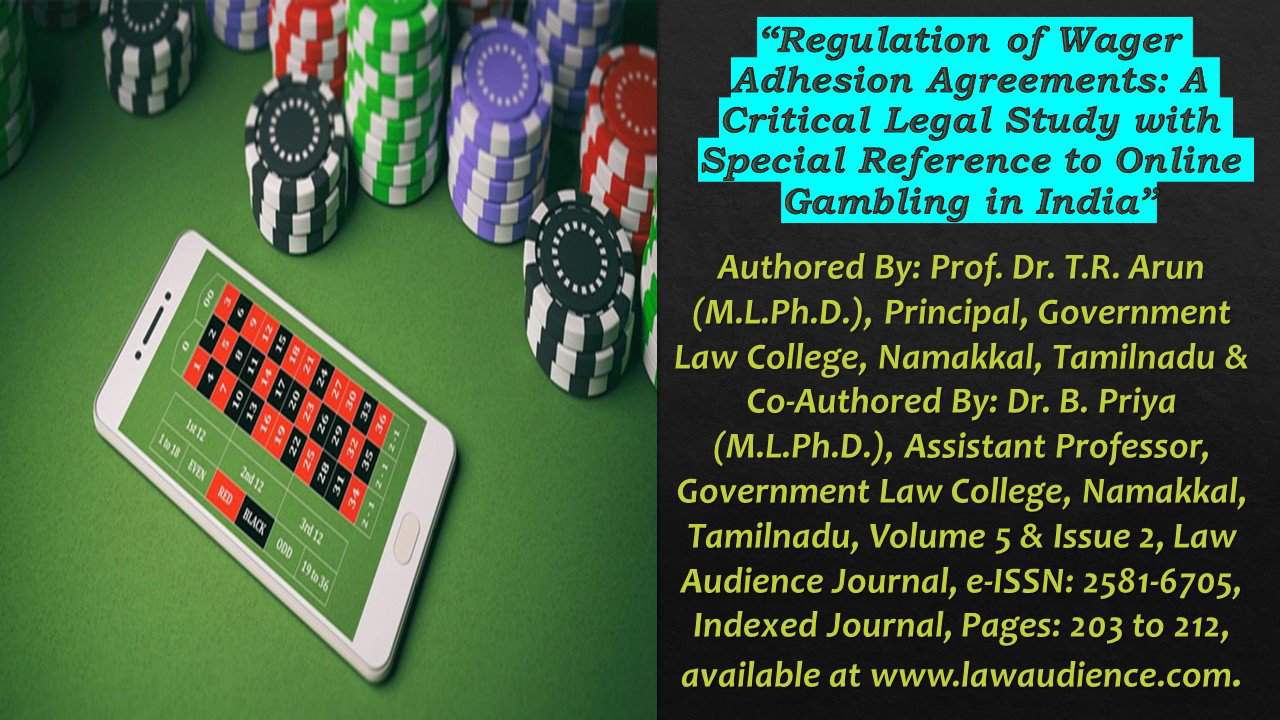Click here to download the full paper (PDF)
Authored By: Prof. Dr. T.R. Arun (M.L.Ph.D.), Principal, Government Law College, Namakkal, Tamilnadu & Co-Authored By: Dr. B. Priya (M.L.Ph.D.), Assistant Professor, Government Law College, Namakkal, Tamilnadu,
Click here for Copyright Policy.
ABSTRACT:
“The world is revolving with around innumerable contracts and agreements at each and every stage of the human being. The wagering agreements are also evolving along with mankind right from the dice of the ancient age to the online gaming of digitalised age. Serving as a source of revenue and leisure on the brighter side, online gambling also has victimized the layman in its darker side. The online gambling website agreements that are clicked accepted without reading prove to be averse to the players. Though the countries like US and UK have white regulated Legislation related to online gaming, still most of the countries like India are under an ambiguous grey legislative stage holding wager agreements to be void. This article makes a theoretical analysis of Laws on the regulation of online gaming in India with reference to the Law Commission report and Judicial decisions. The increasing invasion of online gambling instructs the need for Uniform Harmonious regulation in India to eliminate the negative effects of online wager adhesion agreements”.
Keywords: Online Wager Adhesion Agreements, Gaming Laws, Problem Gambling, Gaming Revenue.
I. INTRODUCTION:
The world is revolving and rotating along with innumerable contracts and agreements at each and every stage of the human being. A wagering agreement is an agreement among persons with opposite intentions of mind with mutual chances of gain or loss upon the result of an uncertain event with no interest other than staked amount.[1]Wagering gaming activities that initially started as a Leisure time hobby has now grown into a huge business industry evolving from traditional to digital transformation. Wagering agreements relate to agreements involved in Betting, Horse racing, Gambling and other related games. Though held and declared to be void under the Indian Contract Act 1872, wagering gaming activities increase in many folds. Traditionally, wagering game machines like slot machines, and video poker has been confined to Brick-mortar buildings, like casinos.[2] With the proliferation of interest and use of the Internet, shrewd wagering game manufacturers have recognized global public networks, such as the Internet in various locations of the world. According to the World Gambling statistics, in 2019, 26% of the population, approximately 1.6 billion people worldwide, gamble. As per a recent KPMG study in 2019, online gaming grew 45% in FY20 with the user base surpassing 365 million by March 2020 on real-money games (RMGs) and online gaming is expected to reach INR118.8 billion from the financial year 2018-23.[3] The three key segments of online gaming are real money games (RMG) like Rummy, mobile-centric/casual games like candy crush and e-sports like FIFA.[4] The fast pace of online technology development in recent years has facilitated the provision of gambling services through diverse remote distribution channels. The potential threat of online gambling’s cannibalization of the offline gambling market is an industry hot topic in most of the conferences and the media[5]. In-Play-betting, Online Gambling have given rise to a continuous form of gambling with implications for problem-betting.[6] The main objective of the paper is to mainly analyse the validity of online wager adhesion agreements mainly of online gambling oscillating between games of skill and chance through judicial decisions and Gaming Laws in India.
II. BACKGROUND OF ONLINE WAGERING AGREEMENT:
In about 200BC there was evidence of some sort of lottery to fund state works and King Richard outlawed dice among his soldiers in 1190. The commercialization and development of internet service providers in the 1980s resulted in the increased growth of online gaming in the general population and the appearance of internet sites in the 1990s.[7] In 1995, the first offshore Internet gambling sites were opened in Antigua and Barbuda where Internet gambling was legal. Gambling sites started to work on the Internet in 1997, and Microgaming was the first one among others and their first casino was named “Internet Casino System Version IV.[8] The Internet has transformed the gambling industry into a global market accessible to a significant proportion of the world population.[9] Each transaction includes terms and conditions accessible by hyperlink or by scrolling through a screen with the terms and conditions forming wagering adhesion agreements.[10]
III. PROS & CONS OF ONLINE WAGERING GAMBLING:
The debate on online gambling goes on with different views. According to the Neo-liberal economic view, it upgrades economic development by creating employment opportunities and revenue.[11] But as per moral view, the vice activity downgrades the financial status of individual players. Those who are favouring gambling describe the relation between morality and gambling to be derivative and it is suggested to be segregated for regulating it.[12]In partial alignment with assumptions, online gamblers were proportionately more often younger than strictly land-based gamblers.[13] The younger generation is more prone to online gambling leading to problem gambling. The detriments of online gambling as per the European Commission are[14];
- i) Structural detriments-offshore operators, Legal offer
- ii) social detriments – fraud, minor
iii) Player detriments – misinformation, inadequate assistance, problem gambling
Problem Gambling is defined as “pathological” or “compulsive” gambling, a progressive addiction characterized by increasing preoccupation with gambling resulting in restlessness or irritability when attempting to stop, “chasing” losses.[15] Match-fixing is also one of the most significant threats to the integrity of sports and destroys the core social, cultural and educational values of sports, as well as undermining its economic role.[16]Internet accessibility addicts the younger generation lacking remedy on getting affected by online gambling and hence resulting in the suicide of the younger generation.
The supply side of Internet gambling can be divided into three main categories:
- offers by fully licensed providers in the targeted territory;
- offers by fully licensed providers in non-targeted territories; and
- offers by unlicensed and unauthorised providers.[17]
The first category is a legislative challenge that can be brought under subordination of State Government’s Legislation, but the other two categories have to be controlled by the harmonious endeavours of all the State Government. In India, Legislation relating to gambling is under grey (ambiguous) legislation. The lacunae in the regulation of online gambling leads to underground, unlicensed and illegal gambling at the fingertips of the younger generation.
IV. CLAUSES IN ONLINE GAMBLING AGREEMENT:
In Online Gambling, Terms & Conditions and Privacy Notice serve as Adhesion Agreements bridging the website and players. On analysing various online Rummy websites, the observed main clauses are:[18]
- User Representation or Identity clause requiring details and account verification of players. It is interesting to note that for states where Online gambling is regulated or prohibited, players are barred from playing online gambling as per the terms of the website.
- Breach & Consequences clause entitle to forfeit the cash balance in the user account and the right to demand damages for breach and to initiate an appropriate civil action to recover such damages
- In the Complaints, Grievances &Disputes clause, it is instructed that any complaints and disputes must remain confidential till and after seeking resolution and they must not be disclosed to a third party.
- In the Limitation of liability clause, the website protects itself as not responsible for any liability on misuse of the account
- By disclaimer and indemnity clause, the website clearly disclaims all liability but claims to be indemnified on any defamation.
- In the Jurisdiction clause, Jurisdiction is as determined and mentioned in the terms and conditions of the online gambling website operator. In the New York gambling case People v. World Interactive Gaming,[19] as the players from gambling prohibited state can play under the fake identity of gambling permitted state, the New York state succeeded in obtaining a conviction against an offshore Internet casino. The inter-jurisdictional inconsistency is mainly due to the mingling of unlicensed gambling sites, partial legalization and regulation and open markets lacking restrictions.[20] The inclusion of the Arbitration clause will be a confident factor as online wagering agreements are not enforceable in most countries and as mostly online gambling involves International Jurisdiction.[21] Internet enthusiasts appreciate the global reach of the internet to nooks and corner of the world but the denial of justice through clauses in the agreement from the remote world remains unnoticed.[22] The Terms and Conditions in online gambling websites are one-sided adhesion agreements favouring gambling operators and victimising the younger generation.
V. ONLINE GAMBLING IN INDIA:
In India, the ancient existence of Gambling is evident from the great Epics like Mahabharata, Ramayana and in the great Vedas, Manu and Smritis.[23] The Laws regulating gambling has been present from the ancient period of time. The Public Gambling Act, 1867, was enacted with the purpose of punishing public gambling and keeping common gaming houses. The Public Gambling Act ceased to be a Central Legislation after 1935 as the States are provided with Gambling regulating powers. According to Section 2 (1) (as) of the Prevention of Money Laundering (Amendment) Act, 2013, gambling and casino activities deemed as designated businesses/professions enjoy protection under Articles 19(1)(g) and Article 301 of the Constitution of India. The Sikkim Online Gaming (Regulation) Act, 2008 is the first Indian legislation to expressly permit and regulate online gaming. In the Nagaland Prohibition of Gambling and Promotion and Regulation of Online Games of Skill Act, 2015, section 2(3) defines the term, “games of skill”, to include all such games where there is preponderance of skill over chance. The Tamil Nadu Government also passed Ordinance banning online gambling on November 20,2020 after the banning of Online Gaming in the States of Andhra Pradesh and Telangana. According to the ordinance, the players shall be punished with a fine of Rs.5000 (five thousand) and six months imprisonment. The people opening or running gambling houses are punishable with a fine of Rs.10,000 (Ten thousand rupees) and two years’ imprisonment.[24] According to section 30 of the Indian Contract Act,1872, wagering agreements are considered to be void but not as illegal except in the states of Gujarat and Maharashtra and it does not prohibit the execution of collateral wagering agreements. The Skill Test is used to determine the protection of wagering agreements involving skill under the exception to section 30 of the Contract Act,1872.[25]Now, the wagering agreements related to various gaming agreements and financial derivatives are governed by judicial decisions.[26]
In Kishan Chander & Ors. vs. State of Madhya Pradesh[27], the Supreme Court held that the law to root out gambling must be implemented in the public interest. In the State of Andhra Pradesh vs. K. Satyanarayana & Ors.[28], the Supreme Court held rummy to be a game of skill and not entirely of chance like three card game. In Dr. K. R. Lakshmanan vs. State of Tamil Nadu & A gambling is defined as payment of a price for a chance to win a prize and horse-racing is defined as a game of skill as it relies upon the skill of the player in choosing the appropriate horse and jockey. Hence, gambling is referred to as a game of chance coming under the category of void wager agreement. On receiving the reference from the Supreme Court in Board of Control of Cricket in India vs. Cricket Association of Bihar & Ors.,[29] the Law Commission under the chairmanship of Justice Chauhan submitted 276th report recommending Legal Regulation of Betting and Gambling. In All Kerala Online Lottery Dealers Association v. State of Kerala & Ors.[30], the Supreme Court held that State Government can ban online Lottery if it is not running that form of Lottery and online gambling entering every dwelling reaches every class and preys upon the hard earnings of the poor plundering the ignorant and the simple. The survey on 5580 college students in Kerala, India and of those 19.5% reported having ever gambled and 7.4% reported problem gambling.[31] The laws on gambling vary from state-to-state India maintains Legislation on gambling in the nascent stage with still unambiguous over the gambling agreement as a game of skill or chance.
VI. RESULT AND DISCUSSION:
Online gambling expansion is part of the evolution of the gambling industry, and policymakers can adapt their policies on finding a sustainable solution that benefits society.[32]Offshore Internet gambling operators and alternative financial mechanisms facilitate online gambling in a manner that makes it very difficult to prohibit.[33] Due to Liberalization, Internet gambling policies face difficulties in limiting access to offshore sites. According to the Contract Act,1872, wager agreements are considered to be void except for the games on skill. The online gambling agreement under the game of chance is still with proper answerless questions lacking remedy. Internet accessibility brings online gambling to the fingertips without distinguishing minors and children from adults. Hence internet accessibility and ambiguous regulation on gambling lacks remedy for the aggrieved as wager agreements are void. The judicial decisions also put forward online gambling to be a game of chance based on State regulations.
Players with higher losses tend to have more difficulty in estimating their gambling expenditure.[34] The regulation of Terms and conditions serving as adhesion agreements can bring about Responsible Gaming. The website operators are dominant in placing terms and conditions without proper communication. All electronic forms of gambling shall provide automated pop-up messages to the player about wagered amount and the terms and conditions may be displayed in simple Regional language and disclaimer clause to occupy more than 20% of space for easy understanding for players.[35] The 276th Report of the Indian Law Commission also advocated for linking of Betting and gambling transactions with operator’s as well as player’s/participant’s Aadhaar card/PAN cards for ensuring transparency and State supervision. Article XX GATT and Article XIV GATS allow the member to impose trade restrictions if it is necessary to protect public morals. Satisfying the three balancing test factors laid out by the WTO cases including the importance of societal interest; the contribution of prohibition to tackle the dire consequences of cross-border gambling; and the trade impact for the complaining party.[36] The Legalisation or Prohibition on Online Gambling shall be executed uniformly in a proper manner. The awareness of young gamblers on the perusal of website adhesion agreements and licence terms may well protect the consumer’s life and property. The legendary authors analysed Problem gambling and advocated for regulation by Legislation. The uniform legislation regulating or prohibiting online gambling all over India may protect the younger generation with awareness of the adverse consequences of online gambling.
VII. CONCLUSION:
Regulating the gambling industry is a balancing act. If the alluring advertisements can be in simple two lines, then one-sided terms and conditions in gambling websites may also be simple as audio & video messages in regional languages for easy communications to players. The proper understanding of terms and conditions may be one of the factors to control Problem gambling. The oscillation of wager agreements between a game of skill or a game of chance can be clarified through the regulation of proper gambling laws for providing remedies to the aggrieved. The study shows that every State Government try to regulate online gambling by proper Legislation and also endeavours to combat Problem Gambling through proper execution. Hence there arises the need of uniform regulation in online wager gaming adhesion agreements. The harmonious regulations on various clauses of one-sided gambling website agreements will protect the players. As online gaming knows no border, the harmonious monitoring and regulation of Laws in online wager agreements may be a better tool to protect the player’s rights to life and property.
Cite this article as:
Prof. Dr. T.R. Arun & Dr. B. Priya, “Regulation of Wager Adhesion Agreements: A Critical Legal Study with Special Reference to Online Gambling in India”, Vol.5 & Issue 2, Law Audience Journal (e-ISSN: 2581-6705), Pages 203 to 212 (2nd August 2023), available at https://www.lawaudience.com/regulation-of-wager-adhesion-agreements-a-critical-legal-study-with-special-reference-to-online-gambling-in-india/.
Abbreviations:
KPMG- Klynveld Peat Marwick Goerdeler
GATT- General Agreement on Tariffs and Trade
GATS- General Agreement on Trade in Services
Footnotes & References:
[1]Justice J. Hawkins. in Carlill v. Carbolic Smoke Ball Co., (1892) 2 Q.B.484, at pp.490-491
[2]J.L. Allen, D.E. Gura, & J.M. Hornik, (2013). U.S. Patent No. 8,360,862. Washington, DC: U.S. Patent and Trademark Office.https://patents.google.com/patent/US8360862B2/en at p.1, (Accessed on 06, Dec 2020)
[3]KPMG, The evolving landscape of sports gaming in India, March 2019, atp.2, available at The evolving landscape of sports gaming in India (assets. kpmg)(Accessed on 07 Dec 2020)
[4] Id.at p.04.
[5]Kahlil S. Philander, Brett LL Abarbanel, and Toni Repetti.“Consumer spending in the gaming industry: evidence of complementary demand in casino and online venues”, 15(2) Int. Gambl. Stud.256-272 (2015)at p.258
[6]Hibai Lopez-Gonzalez, and Mark D. Griffiths,“Is European online gambling regulation adequately addressing in-play betting advertising?”, 20(6) GLRE495-503(2016) at p.496
[7]Sally Gainsbury, Internet gambling: Current research findings and implications, (New York: Springer Science & Business Media, 2012) p.151
[8] The History of Gambling, available at The History of Gambling – Complete Gambling History Timeline (Accessed on 05 Dec 2020)
[9]James Banks, Online gambling and crime: Causes, controls and controversies. (Oxfordshire, United Kingdom:Routledge, Taylor& Francis2016) p.200
[10]Jeffrey H. Dasteel, “Consumer click arbitration: a review of online consumer arbitration agreements” 9(1) Arbitr. Law Rev., 1-42 (2017)
[11]Julia Hörnle &Brigitte Zammit,Cross-border online gambling law and policy,(Glos, U.K.: Edward Elgar Publishing,2010)
[12]Harsimran Kalra., Abhishek Mukherjee., & Rajgopal Saikumar, “Twisted Willow, Gambling, Sport and Cricket in India” Hindu Centre of Politics and Public Policy 2013 p.3 available at http://www.thehinducentre.com. (Accessed on 09 Dec 2020)
[13]Robert Edgren, Sari Castrén, HannuAlho, &Anne H. Salonen,“Gender comparison of online and land-based gamblers from a nationally representative sample: Does gambling online pose elevated risk?”72 Computers in Human Behaviour 46–56. 2017 at p.48
[14]European Commission, Impact Assessment ½, Accompanying document on Principles for the Protection of Consumers and Players of Online Gambling Service and for the Prevention of Minors from Gambling Online, July 14,2014, 2014/478/EU
[15]Minn. Department. of Hum. Serv., Compulsive Gambling Annual Report: A Report to the Minnesota Legislature p.9 (2014), availableat https://www.leg. state.mn.us.com (Accessed on 07 Dec 2020)
[16]UNODC IOC Study, “Criminal Law Provisions for the Prosecution of Competition Manipulation”, (2017) available at http://www.unodc.org.com (Accessed on 10 Dec 2020)
[17]Jean-Patrick. Villeneuve,” Gambling Regulation and Risk”, 1(4) EJRR, 1(4), 415-418. (2010)at p.416
[18][18]Terms of service, available atReview Terms of Service – Rummy Circle, Check out Terms of Service of Rummy Culture (Accessed on 02 Dec 2020)
[19]185 Misc. 2d 852, 714 N.Y.S.2d 844 (N.Y. County Sup. Ct. 1999
[20]Sally Gainsbury, Jonathan Parke, and Niko Suhonen,“Consumer attitudes towards Internet gambling: Perceptions of responsible gambling policies, consumer protection, and regulation of online gambling sites”, 29(1) Comput., 235-245,2013 at p.240
[21]Javad Heydary, (2020) chairman and managing director of Heydary Hamilton PC, Arbitration Clauses in Online Gambling Contracts, available at: http://www.canadiangamingbusiness.com (Accessed on 21 Sep. 2020)
[22] Joel R.Reidenberg,“Technology and Internet jurisdiction”,153(6) Univ PA Law Rev., 1951-1974 (2005) at pp.1953-1954
[23]Mukul Mudgal & Vidushpat Singhania, Law and Sports in India: Development Issues and Challenges 226 2ndEd., (Gurgaon: LexisNexis, 2016)
[24] D.Srikkanth, Tamil Nadu Government Bans Online Betting, Rs.5000 fine, jail for Violators, The Times of India updated on Updated: Nov 21, 2020, 05:46 IST https://timesofindia.indiatimes.com/city/chennai/tn-govt-bans-online-betting-games-rs-500,(Accessed on o5 Dec 2020)
[25]Dr. Justice.B.S. Chauhan (2018), 276th Report of Law Commission of India “Legal Framework: Gambling and Sports Betting Including in Cricket in India “dated July 2018, Available at http://lawcommissionofindia.nic.in/reports/Report276.pdf p.21,para 3.20, (Accessed on September 20,2020)
[26]J. Varghese, (2017). Financial Regulation and the Courts: A Comparative Study of Judicial Approach in India, the United States of America, and the United Kingdom. (2017) at p.36, Available at SSRN 2983606.http://dx.doi.org/10.2139/ssrn.2983606(Accessed on 07 Dec 2020)
[27]AIR 1965 SC 307
[28]AIR 1968 SC 825
[29] 20168 SCC 535 192
[30][2015] INSC 804, para 26, Available athttp://www.liiofindia.org/ (Accessed on 03 Dec 2020)
[31]George, S., Velleman, R., & Nadkarni, “A. Gambling in India: Past, present and future”, 26 Asian J Psychiatr., 39-43 2017.
[32]S.E. Mogensen, “Don’t Chase Your Losses: Online Gambling Regulation and Solutions in Minnesota” 44 Mitchell Hamline L. Rev.,1105. (2018) at p.1143
[33]Mattia V. Corsiglia Murawski,“The Online Gambling Wager: Domestic and International Implications of the Unlawful Internet Gambling Enforcement Act of 2006”, Santa Clara L. Rev., 48, 441 at p.470.
[34]Michael Auer and Mark D. Griffiths,” Self-Reported Losses Versus Actual Losses in Online Gambling: An Empirical Study”,33 J Gambl Stud, 795–806 (2017) at p.795
[35]The Advertising Standards Council of India, Press Release, GAME’S UP FOR MISLEADING GAMING ADS- SAYS ASCI, 24th November 2020, available atThe Advertising Standards Council of India – Press Releases (ascionline.org) (Accessed on 09 Dec 2020)
[36]I Gusti Ngurah Parikesit Widiatedja (2018). Can Indonesia Invoke Public Morals Exception under the World Trade Organization (WTO) For Prohibiting Cross-Border Gambling? 7(2) Yustisia Jurnal Hukum, 261-279. (2018) at p.263.



